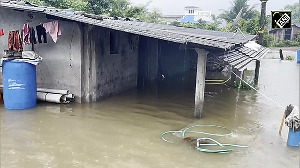India, whose economy is tipped to grow by 7 to 7.5 per cent in 2005-06, on Monday said the projection was not an outcome of mere wishful thinking, but based on aggressive agenda for economic reforms.
"In the first half of the current year, growth was 8.1 per cent, and all available projections for the current fiscal... point to... eventual growth rate of between 7-7.5 per cent," Finance Minister P Chidambaram said, addressing the annual Asian Development Bank board meeting in Manila.
"While some sceptics might be inclined to dismiss these projections as far-fetched, the growing potential of the Indian economy has received recognition from practically all quarters," he said.
The minister quoted the BRICS (Brazil, Russia, India and China) report as identifying India as the only economy that would be capable of maintaining growth rates above three per cent till 2050.
"In order to maintain overall growth rate... at its current levels... we have to remain committed to an aggressive agenda for economic reforms. The main objective of current phase of reforms is to secure high growth," he said.
"The Indian economy has the potential to reach much higher levels. Let me assure you that my expectations are not outcomes of wishful thinking," Chidambaram said.
Such a growth was possible through achieving robust performance levels across sectors, including industry and farm sectors, besides collaboration among countries for "producing welfare-enhancing synergies."
"The challenge before the countries of Asia today is to create and maintain a regional and international environment that is conducive to high economic growth," he said.
"India is fully seized of the need for building partnerships and collaborating with our friends for moving towards individual as well as collective gains," Chidambaram said.
"We have always been engaged with Asia, and with the introduction of the "Look East" policy, this engagement has been enlarged with the objective of reaching out to India's neighbours in East and South Asia," he said.
New Delhi has already begun engaging its Asian neighbours through regional and free trade agreements, including the South Asian Free Trade Area, a framework agreement with Thailand for an FTA, a framework Comprehensive Economic Cooperation Agreement with ASEAN, and a CECA with Singapore.
Prime Minister Manmohan Singh has already announced the target of doubling ASEAN-India bilateral trade from the present level to $30 billion by 2007.
In this regard, Chidambaram pointed to New Delhi cutting down customs duty rates to align them with ASEAN levels.
Turning to the "buzz" about India in global policy, investment and academic circles, the finance minister said much of this could be attributed to India's impressive growth.
He said India's policies were aimed at securing high growth, "while making such growth inclusive to directly influence the living standards of the poor and marginalised sections of our country."





